About 50m from the summit of Yushan (玉山), huddled under a rock outcrop waiting for the first warming rays of daylight to illuminate the final ascent, our Bunung guide named Biung pointed to a spot about two feet from our boots and shouted over the howling wind: "A woman was hit by a rock, lost her balance and was blown off the ledge here and fell to her death in October!" The spot is a notoriously dangerous one, where the winds that gather on the slopes of the mountain as the temperature rises in the valley far below funnel up and over Taiwan's tallest mountain reaching velocities that are, well, strong enough to carry someone away with it.
Minutes before, awe-inspiring rainbows were forming and dissipating in the clouds that rushed past over the ridge and down the eastern side of the mountain. At moments, the clouds would clear to reveal the early-morning sun-drenched terrain of the Central Mountain Range spreading into the distance in hues of gold and green. Everything looks tiny from the majestic heights of Yushan. But, with the guide's few, matter-of-fact words, the mountain became menacing, even lethal.
Romeo Carey, a Californian filmmaker in Taiwan to shoot a small-budget, independent production with scenes on Yushan, shook his head and said in the tone of someone who has just been informed that something terrible will soon occur: "Man, what are we doing here? I don't need this."
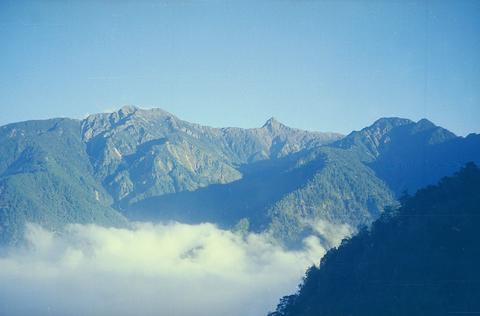
Big, bad mountain
Even under ideal weather conditions in spring and fall, when most people make the trip, the trek to the top of Yushan is a strenuous one that requires attentive preparation.
At just under 4,000m, the mountain is high enough to leave marathon runners breathless, and city-dwelling, neophyte mountain climbers in gasping tatters at the base camp.
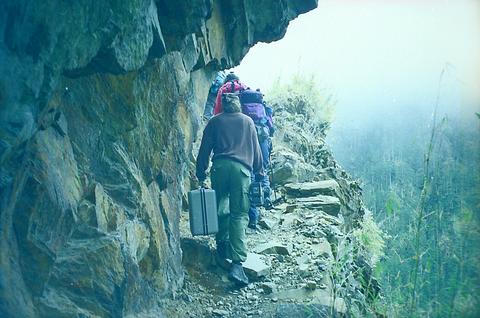
Aside from acute mountain sickness, which can fell the hardiest of climbers, and hypothermia, the Yushan National Park Headquarters also warns of poisonous snakes, poisonous insects, bears, sunstroke, rockslides and floods -- and only the bears and floods do not occur in abundance along the trail. Yushan is simply not a forgiving environment, and, as we would learn, is not ideal for shooting a film.
But the mountain is also one of the most popular hikes in Taiwan, with no less than 40,000 reaching the summit every year, according to the park headquarters' statistics. Controls in effect for the past three years permit only 150 hikers on the trail at any given time. Nonetheless, on busy days crowds are enough to create bottlenecks at numerous points along the 12km trail to the summit.
This was certainly not the situation two weeks ago, when our group was making the climb. Most hikers, with good reason, leave Yushan alone in winter, scared off by the temperature at the summit, which hovers at or below freezing, and the ferocious winds. What's more, in winter the top several hundred meters of the mountain, which is solid rock, adopts a shiny coat of thin ice, making any foothold or grip tenuous at best.
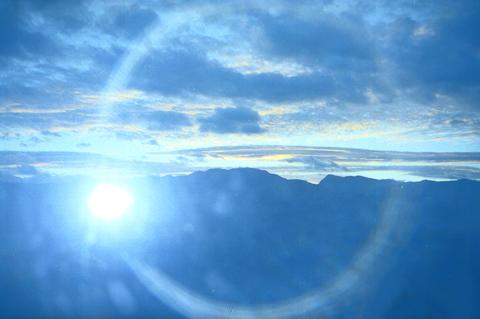
PHOTO: MAX WOODWORTH, TAIPEI TIMES
So, catching our breath just under the summit during our recent trip, the potential for a medium-altitude, Taiwanese remake of Into Thin Air -- the story of the 1996 Mt. Everest disaster that killed nine climbers -- seemed high.
Motley crew
Regulations require that climbers to Yushan join a group led by an experienced guide who is familiar with the trail.
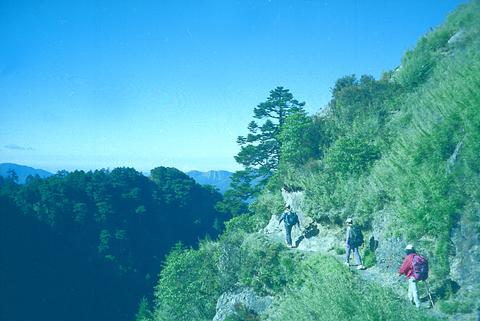
PHOTO: MAX WOODWORTH, TAIPEI TIMES
Our group was in the experienced hands of a posse of hardened mountain men, most of whom had seen peaks far more intimidating than Yushan.
At the start of the trek, within minutes of setting out from the trail head at Tataka
"We move fast to work out the kinks," Lin said later, referring to the guides' heavy revelry in Alishan the previous night.
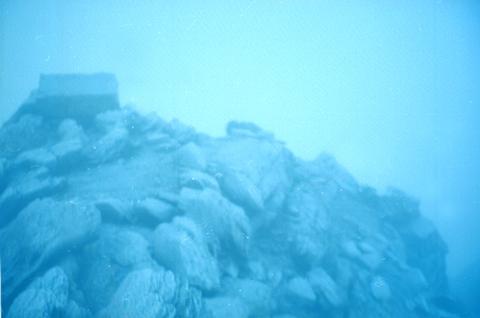
PHOTO: MAX WOODWORTH, TAIPEI TIMES
Picking up the rear were Carey and the five members of the film crew, who were slowed by debilitating injuries sustained in earlier shoots near Taipei and the substantial weight of the camera, which had to be lugged in a hard case for protection. Porters, whom the crew had expected, did not materialize, which led to the awkward sight of Carey trudging along the high-mountain trail carrying a silver suitcase.
The film they had come to shoot, called On the Trail, is a road movie with a plot that loosely reflects the ongoing American campaign against terrorism, or at least Carey's and screenwriter Lynn Miles' somewhat idiosyncratic view of events.
Carey said the production is more of a side project and mostly an excuse to visit Taiwan. "Who knows what kind of release the film will get. This is really just for the fun of it," he said.
Part of the movie's voyage to enlightenment entails climbing Yushan, which is what led the team of decidedly non-climbers to Taiwan's tallest mountain in the dead of winter.
Mountain wilderness
Hiking Yushan is a two-day endeavor, with the first day consumed by reaching Paiyun and the second beginning with a final ascent to the summit followed by a marathon hike all the way back to the Tataka trail head.
On the arduous walk to Paiyun our team was quickly lulled by the arresting beauty of the narrow valley and the forboding, ashen skies.
The opposing side of the valley, as the path winds its way up the mountain, is an extravagantly fissured sheer rock face, which through heavy, sluggish fog looked either much closer or further than it turned out to be. Coating the cliffs were gleaming, frozen waterfalls.
The rarified sight of snow, ice and coniferous trees combined with the biting wind gave the Yushan ecological protection area a distinct feel of mountain wilderness.
Driving home the sense of isolation was the look of relief on the face of poor Mr Ho, the Forestry Bureau's winter caretaker of Paiyun cabin as our group filed in over several hours in the late afternoon on the first day.
"There hasn't been anyone through here in three days," he said, as he cornered some in the group for lengthy run-downs on the mountain and the cabin, which can accommodate up to 90 people and is kept in spotless condition by Ho.
Probably out of mercy for the cabin's caretaker, the Forestry Bureau has installed satellite TV, but because the electricity only runs between 4pm and 8pm, Ho said the only thing he could watch were daytime soap operas, puppet shows and TVBS News.
"When the sun goes down you basically go to bed. There's no point staying up because there's no light to do anything. So I get a lot of sleep up here," he said.
Later, as the sun was going down and turning the fog into an anarchy of purples, oranges and reds, a hiker turned to Ho to offer an encouraging comment about how lucky he was to live in such an environment. He remained silent, though.
Here comesthe sun
There is a certain mystique in the Taiwanese mindset about witnessing a sunrise from the summit of Yushan. It has similar romantic associations to seeing the sunset at Tamsui and our guides, quite naturally, operated on this single-minded agenda.
From Paiyun, this requires waking at 3am and trudging half-asleep with only flashlights to light the path up the remaining 2km of trail to the summit.
In the pre-dawn obscurity, the film crew captured the odd sight of a string of lights winding its way step by step up the switchback trail. Anyone who wasn't awake was jolted to attention when the camera's powerful backlight illuminated rock chutes that gave way into nothingness.
Finally, at 6am, we were assembled at the deadly ledge directly below the summit with Biung telling us of Yushan's latest fatality. Everyone, with the exceptions of the guides, who said they had climbed the mountain more times than they could count, wore the anxious expressions of refugees or natural disaster victims.
Biung assured us that the conditions were normal -- for mid-winter. So, about 20 minutes later, when the cold was becoming unbearable and the first light began to reflect off the clouds and ice-covered rocks, we made a break for it over the ridge and clambered up gripping the chains that have been put in place on the final stretch.
With the deafening wind stirring ominous thoughts, the group progressed one limb at a time, practically hugging the mountain. The summit came into view and a few minutes later there we were, in one piece, standing at acute angles into the wind on the top of Taiwan -- staring into thick fog.
Because of the clouds, there would be no photogenic sunrise on Yushan that day. But the snow-covered marker at the summit pointing the cardinal directions and reminding us that we were at 3,952m was exhilarating enough.
Ducking onto the eastern side behind a boulder and out of the wind the film crew huddled to keep warm. Carey unwrapped his camera, which he had strapped into a backpack instead of using the hard case, and let out a deep groan.
"There's a bubble in the lens," he said darkly.
Lack of air pressure, condensation and low temperatures conspired to create a large bubble between glass sections within the lens, making filming impossible and potentially ruining the US$10,000 camera.
Not only would there be no spectacular sunrise, there would be no filming either.
Worth the wear and tear
Despite the unpredictable conditions at the summit, climbing Yushan in winter offers the rare chance in Taiwan to appreciate breathtaking alpine scenery and to experience environmental and climatic extremes in relative solitude.
The trail to Paiyun is well-worn and travels from subtropical vegetation through alpine meadows and coniferous forests to high-mountain scrub and eventually to solid rock. The frigid air carries the scent of pines and the sun is bright enough to inflict sunburns in sub-zero temperatures.
While at the summit, looking down at the bubble in his camera Carey correctly noted that the shots on the summit of Yushan could have been made on a gravel pile in Taipei with some fancy editing and computer effects. Later, though, he conceded that the chance to climb to the summit was, in retrospect, well worth the effort -- as long as the camera could be repaired.
"This mountain really just blows me away," he said.
This is true, no matter what happens at the summit -- and most people make it home just fine.
For your information:
Visit Yushan's official Web site for English-language information on the mountain's trails, cabins and guide services at http://www.ysnp.gov.tw. From there follow the "Engilsh" link.

From the last quarter of 2001, research shows that real housing prices nearly tripled (before a 2012 law to enforce housing price registration, researchers tracked a few large real estate firms to estimate housing price behavior). Incomes have not kept pace, though this has not yet led to defaults. Instead, an increasing chunk of household income goes to mortgage payments. This suggests that even if incomes grow, the mortgage squeeze will still make voters feel like their paychecks won’t stretch to cover expenses. The housing price rises in the last two decades are now driving higher rents. The rental market

July 21 to July 27 If the “Taiwan Independence Association” (TIA) incident had happened four years earlier, it probably wouldn’t have caused much of an uproar. But the arrest of four young suspected independence activists in the early hours of May 9, 1991, sparked outrage, with many denouncing it as a return to the White Terror — a time when anyone could be detained for suspected seditious activity. Not only had martial law been lifted in 1987, just days earlier on May 1, the government had abolished the Temporary Provisions Effective During the Period of National Mobilization for Suppression of the Communist

Hualien lawmaker Fu Kun-chi (傅?萁) is the prime target of the recall campaigns. They want to bring him and everything he represents crashing down. This is an existential test for Fu and a critical symbolic test for the campaigners. It is also a crucial test for both the Chinese Nationalist Party (KMT) and a personal one for party Chairman Eric Chu (朱立倫). Why is Fu such a lightning rod? LOCAL LORD At the dawn of the 2020s, Fu, running as an independent candidate, beat incumbent Democratic Progressive Party (DPP) lawmaker Hsiao Bi-khim (蕭美琴) and a KMT candidate to return to the legislature representing

Fifty-five years ago, a .25-caliber Beretta fired in the revolving door of New York’s Plaza Hotel set Taiwan on an unexpected path to democracy. As Chinese military incursions intensify today, a new documentary, When the Spring Rain Falls (春雨424), revisits that 1970 assassination attempt on then-vice premier Chiang Ching-kuo (蔣經國). Director Sylvia Feng (馮賢賢) raises the question Taiwan faces under existential threat: “How do we safeguard our fragile democracy and precious freedom?” ASSASSINATION After its retreat to Taiwan in 1949, the Chinese Nationalist Party (KMT) regime under Chiang Kai-shek (蔣介石) imposed a ruthless military rule, crushing democratic aspirations and kidnapping dissidents from